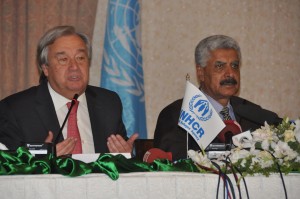24 June, 2015
Joint Communique issued by the UN High Commissioner for Refugees, Mr. António Guterres and Minister for States and Frontier Regions, Lt. Gen. (Retired) Abdul Qadir Baloch on the occasion of the UN High Commissioner’s Ramadan Solidarity Visit to Pakistan

The UN High Commissioner for Refugees António Guterres and Federal Minster for States & Frontier Regions, Lt. General (R) Abdul Qadir Baloch addressing a press conference in Islamabad. © UNHCR/A. Shahzad
1) This Communique is being issued in pursuance of the UN High Commissioner’s meetings with the acting President and Prime Minister of Pakistan, detailed deliberations held with the Minister for States and Frontier Regions, the Advisor to the Prime Minister on National Security and Foreign Affairs and the Governor of Khyber Pakhtunkhwa, as well as his visit to the Afghan refugee/TDP camp in Khyber Pakhtunkhwa.
2) The UN High Commissioner for Refugees expressed his appreciation and solidarity with the Government and people of Pakistan for having generously hosted the world’s largest protracted refugee situation for nearly four decades, in line with the Islamic values of hospitality and generosity. He highlighted the important contribution that Pakistan’s generosity has continued to make to regional stability, but also more broadly to the global refugee cause, at a time when the world witnesses increased asylum fatigue and pushbacks of refugees amidst unfolding humanitarian crises that have in 2015 uprooted the largest number of people in the recorded history.
3) The UN High Commissioner for Refugees and Minister SAFRON commended the ownership and commitment of the National Unity Government of Afghanistan, at the highest levels, on finding solutions to long-standing displacement issues. They acknowledged the vision of H.E. President Mohammad Ashraf Ghani to make Afghanistan the common home of all Afghans and to ensure that no Afghan is forced to live away from his home in the future. They welcomed concrete steps taken to fulfill this resolve, such as the establishment of the National Refugee Commission under his auspices, and the commitment of the Ministry for Rural Rehabilitation and Development to enable access of returnees to rural and urban community infrastructures through the National Solidarity Programme.
4) The international community has long recognized that voluntary return and sustainable reintegration of Afghan refugees is critical for security and stability in the region and beyond. As such, they stressed the need to seize the momentum in 2015 which, despite prevailing challenges, offers unprecedented opportunities for sustainable voluntary return and reintegration of Afghan refugees, within the framework of the Solutions Strategy for Afghan refugees (SSAR).
5) Against this background, they called on the international community to redouble their engagement in Afghanistan and support the efforts of the National Unity Government at this critical juncture of its nation building and reconciliation processes. Robust development initiatives aimed at creating long-term incentives for durable return and conditions conducive for sustainable reintegration in Afghanistan are vital to create pull factors and allow for inclusion, participation and active contribution of returning Afghans, particularly the youth. Furthermore, the international community’s collective engagement in closing the world’s most protracted refugee chapter can serve as an inspiring achievement in an era when global displacement reaches an unprecedented scale.
6) Traditional approaches are no longer sufficient to fully capitalize on the potential for solutions in 2015 in view of prevailing challenges in Afghanistan. As such, and in order to maximize the impact in an environment of shrinking humanitarian resources, it is vital to pursue innovative solutions and creative joint advocacy and resource mobilization.
7) Complementary to robust community based development initiatives in Afghanistan, the introduction of an Enhanced Voluntary Return and Reintegration Package (EVRRP) can help stimulate voluntary repatriation and support sustainable reintegration of Afghan refugees, as the preferred solution and key objective of the Solutions Strategy for Afghan Refugees which enters the second stage of its implementation in 2015-17.
8) Pro-active joint resource mobilization with non-traditional and traditional donors, led by the Government of Afghanistan, supported by the Government of Pakistan and facilitated by UNHCR is being pursued to secure funding for the implementation of EVRRP and the overall Solutions Strategy for Afghan Refugees. As an important first step in these efforts, a joint mission to the Gulf Cooperation Council countries is planned for the end of August 2015.
9) As agreed at the 25th Tripartite Commission Meeting held in Islamabad in March 2015, the Governments of Afghanistan and Pakistan, with the support of UNHCR, will continue jointly developing mutually reinforcing plans for phased voluntary repatriation of Afghan refugees to their homeland and for their management in Pakistan in line with the absorption capacity in Afghanistan and the realities on the ground. The Government plan will be finalized by August 2015.
10) The Joint Government-UN Refugee Affected and Hosting Areas (RAHA) initiative has since its launch in 2009 provided vital assistance to 10.6 million individuals, including both Afghan refugees and their Pakistani host communities. The continued and reinvigorated support of the international community for RAHA is an essential demonstration of tangible burden sharing and solidarity with the people of Pakistan for hosting the world’s largest protracted refugee population.
11) The decision of the Government of Pakistan to document unregistered Afghans on its territory, followed by the issuance of travel documents by the Government of Afghanistan, is an important first step aimed at ensuring identification and management of the unregulated stay of Afghans in Pakistan and complex cross-border population movements.
12) In line with UNHCR’s global efforts to raise the profile of the Afghan refugee situation higher on the agenda of the international community, the 2015 High-Level Segment (HLS) of the 66th Session of UNHCR’s Executive Committee will be dedicated to the Afghan refugee situation. The HLS will acknowledge the contribution of host countries and seek to garner enhanced political and financial support from the international community in support of host communities and towards the lasting solutions for Afghan refugees.
Share on Facebook Share on Twitter